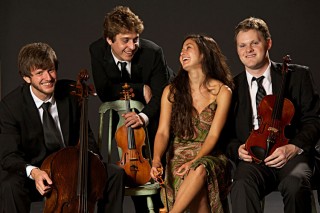Title

The Aeolus, Juilliard’s graduate string quartet in residence: Alan Richardson, Nicholas Tavani, Rachel Shapiro, and Gregory Luce.
(Photo by Nathan Russell)One of the sad realities of contemporary composition is that, too often, new pieces are only played once. But the Aeolus, Juilliard’s graduate string quartet in residence, has been able to buck that trend by performing Ariel Ascending, by former faculty member Christopher Theofanidis, numerous times, including on May 5 at Alice Tully Hall.
Body
The occasion is the 21st annual Lisa Arnhold Memorial Recital, which generally culminates the residency of that year’s quartet. In the case of the Aeolus, however, it’s not an end but a midpoint: the group’s residency has been extended through next year. The ensemble was formed in 2008, when its members were studying at the Cleveland Institute of Music; they are violinists Nicholas Tavani and Rachel Shapiro, violist Gregory Luce, and cellist Alan Richardson.
The Aeolus discovered the Theofanidis piece after receiving a National Endowment for the Arts American Masterpieces grant. They were scouring the Internet for new music when they came upon a 30-second clip of the piece. “That was all we needed to fall in love with it,” Tavani told The Journal. Over this past season—during which the quartet has performed it at the New School and Stanford as well as in Virginia and Maryland—“we’ve been captivated by its wild, intertwining lines and moments of still beauty,” he added. “The first movement is sinuous and writhing, and it’s definitely not tonal, but it has moments of tonal glory at the end of the first and third movements. It also has one of the most satisfying endings in the repertoire.”
Having a chance “to really delve into a piece the same way we would study Haydn or Beethoven has been great,” Tavani said. Not that there’s anything wrong with Haydn or Beethoven, of course. Also on the May 5 program is Haydn’s String Quartet in D Major, Op. 76, No. 5, which Tavani said, “has one of the greatest slow movements ever: it’s marked mesto, or sad, but it’s in F-Sharp major. You don’t think of a major key being associated with sadness, but it really has a deep longing.” The quartet will close the concert with Ravel’s String Quartet in F Major, which Tavani describes as “a masterpiece all around. There’s not a note that’s extraneous, but it still manages to be atmospheric and diffuse.”




